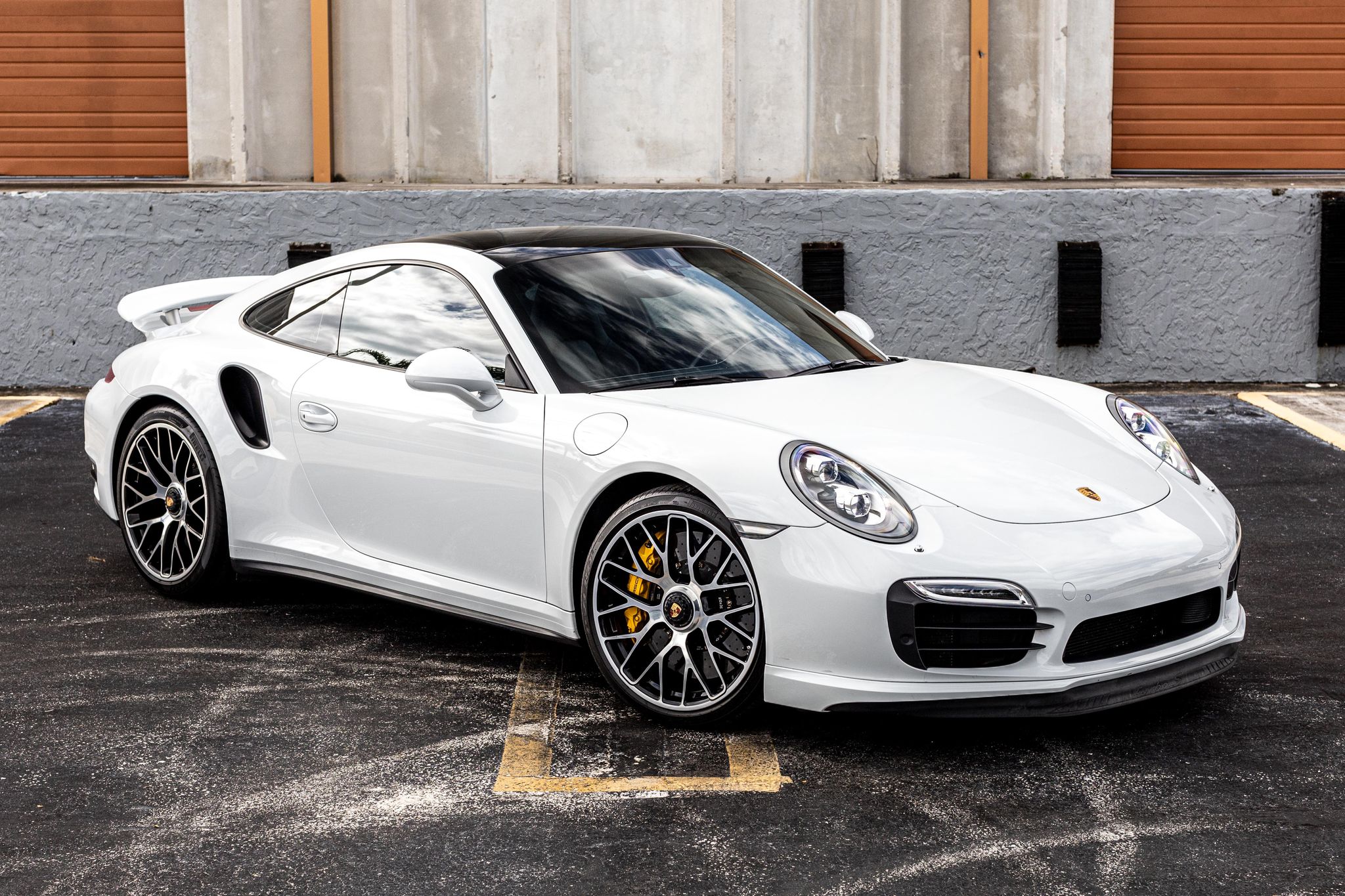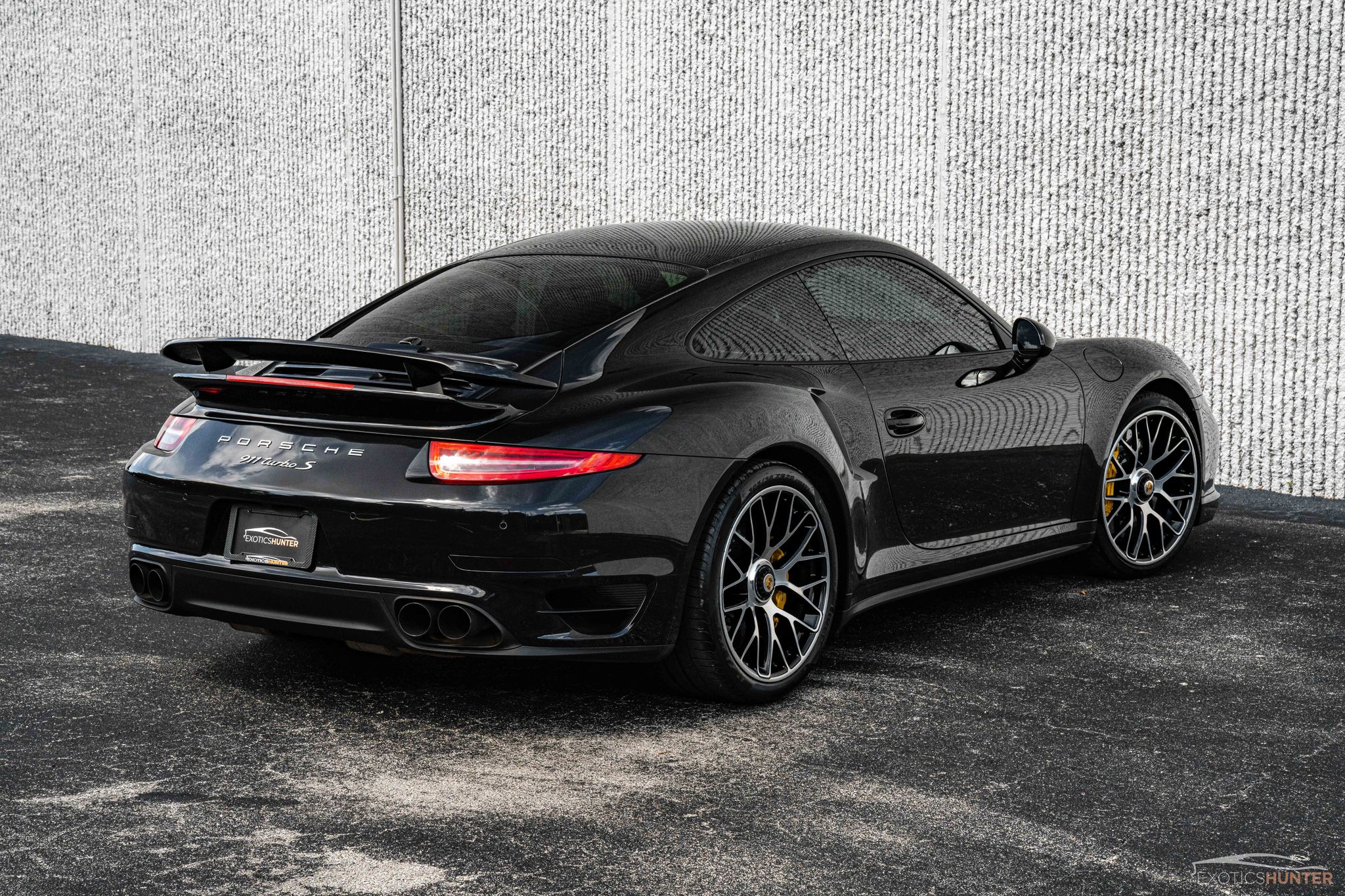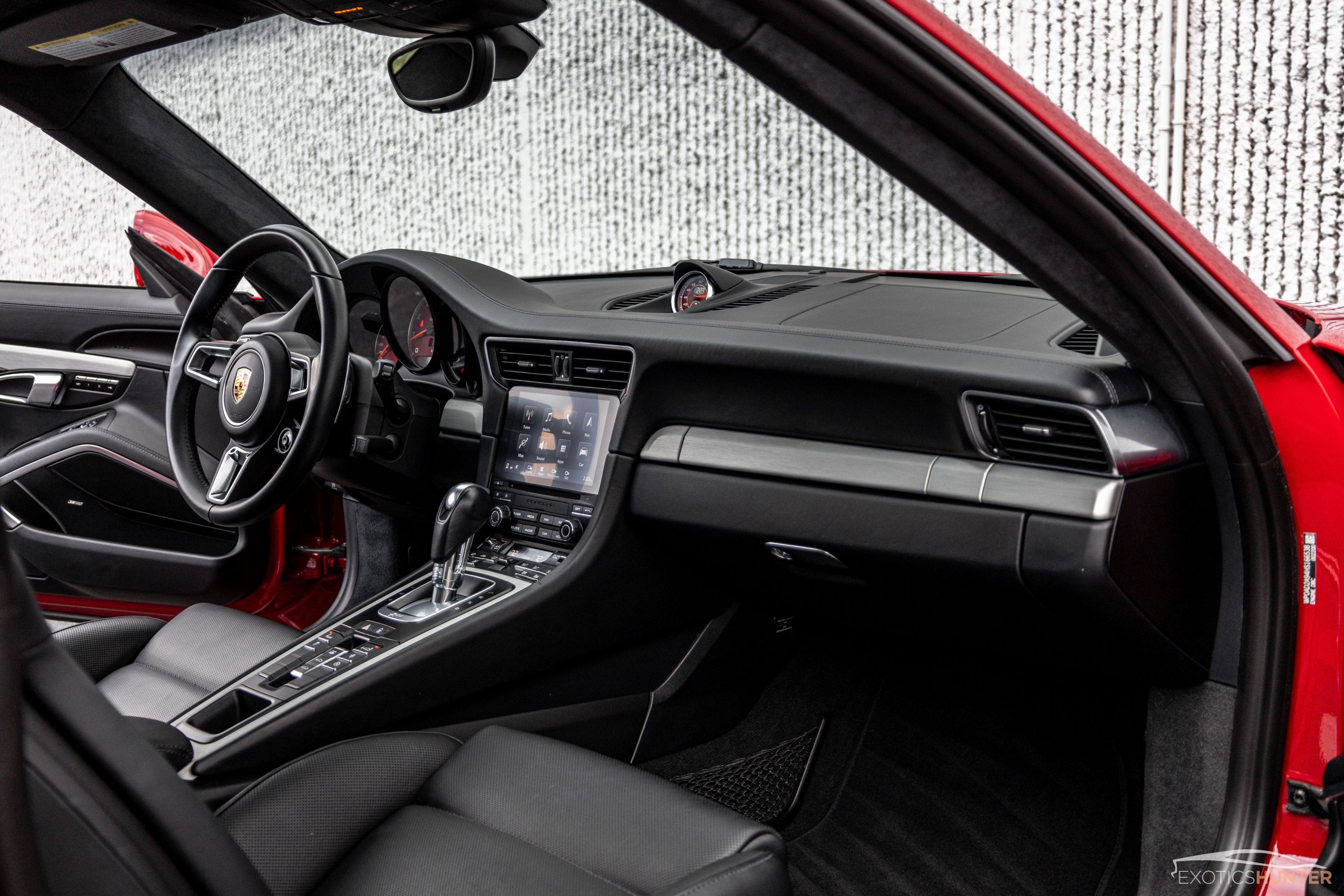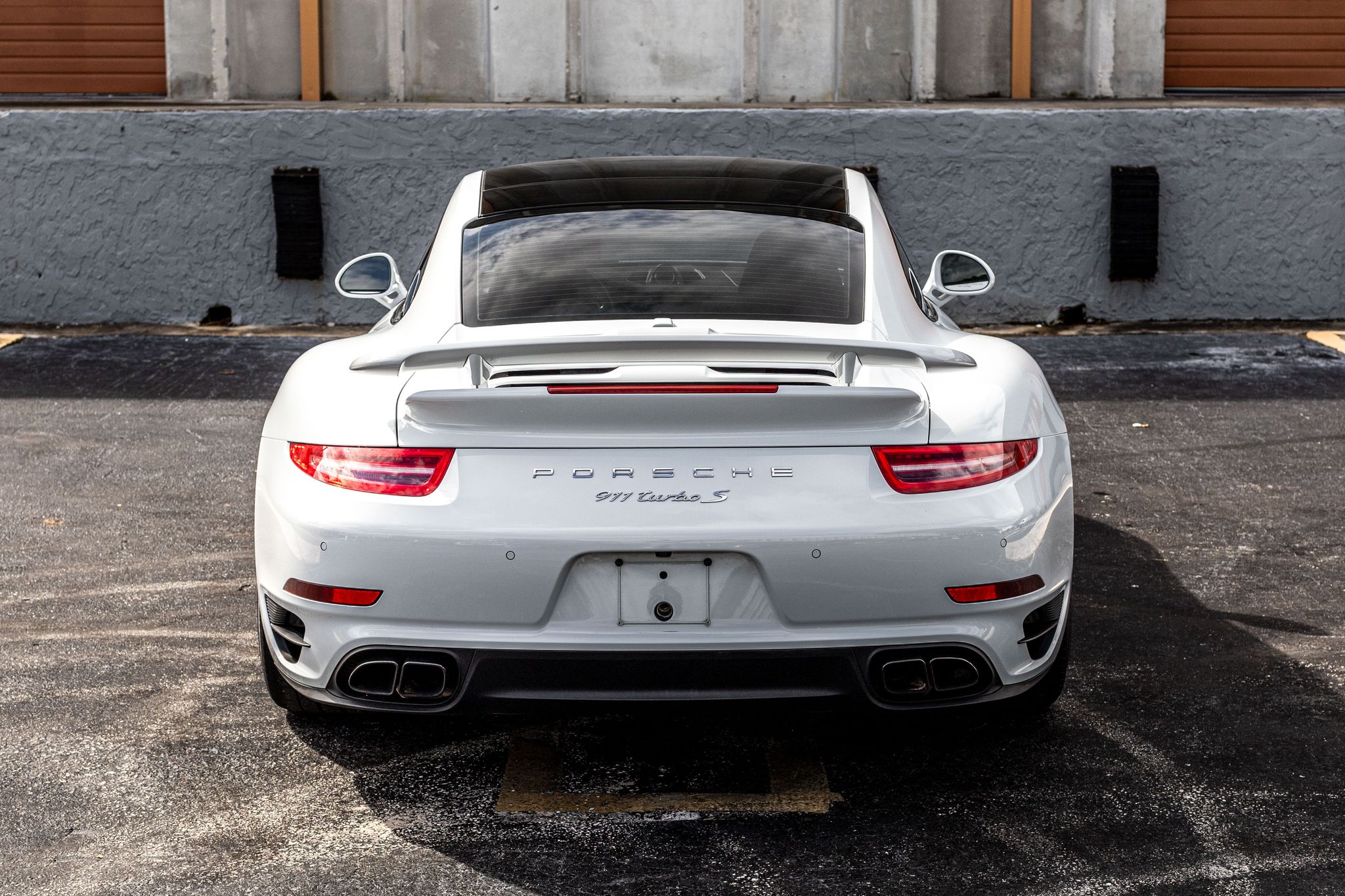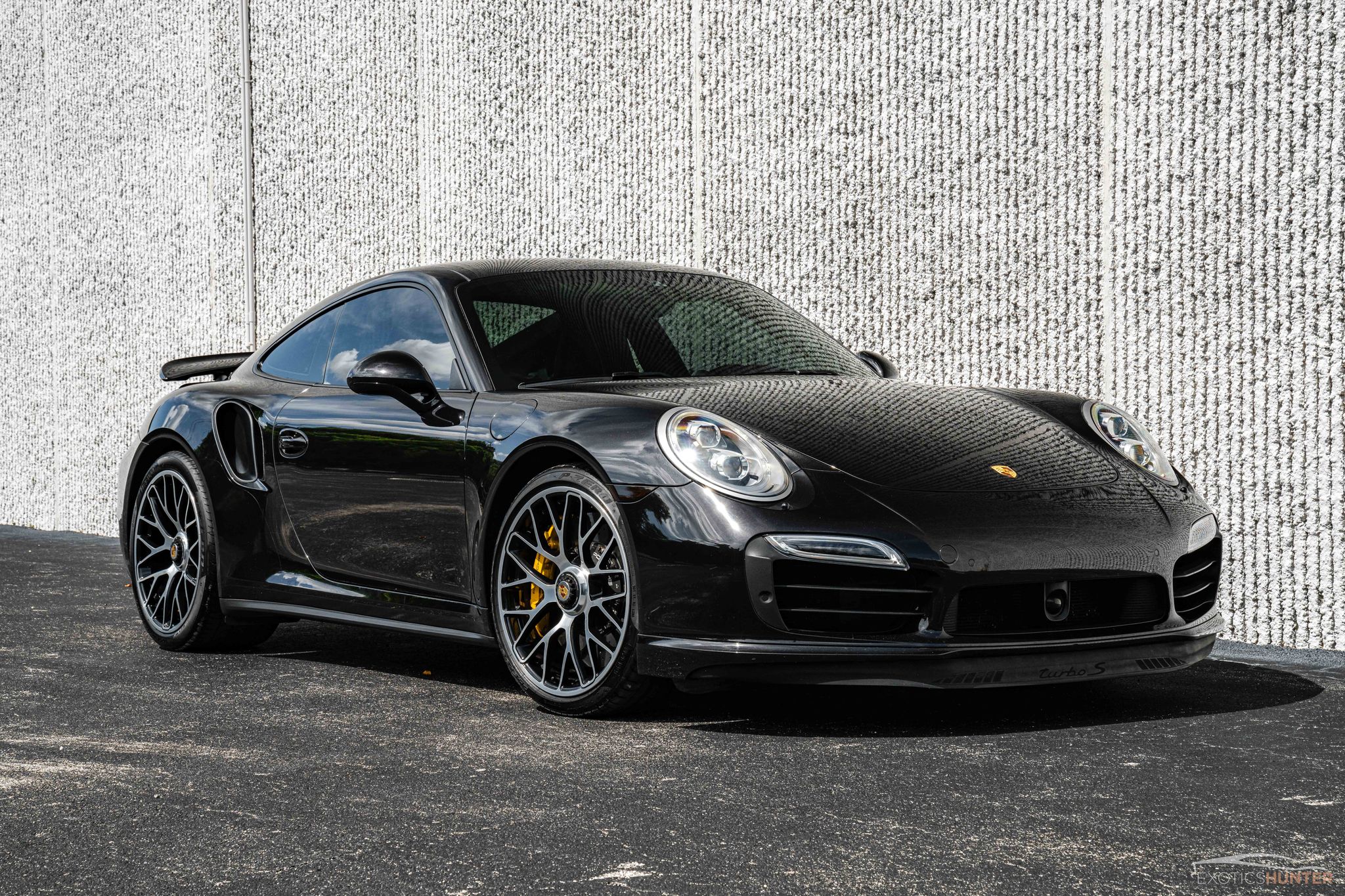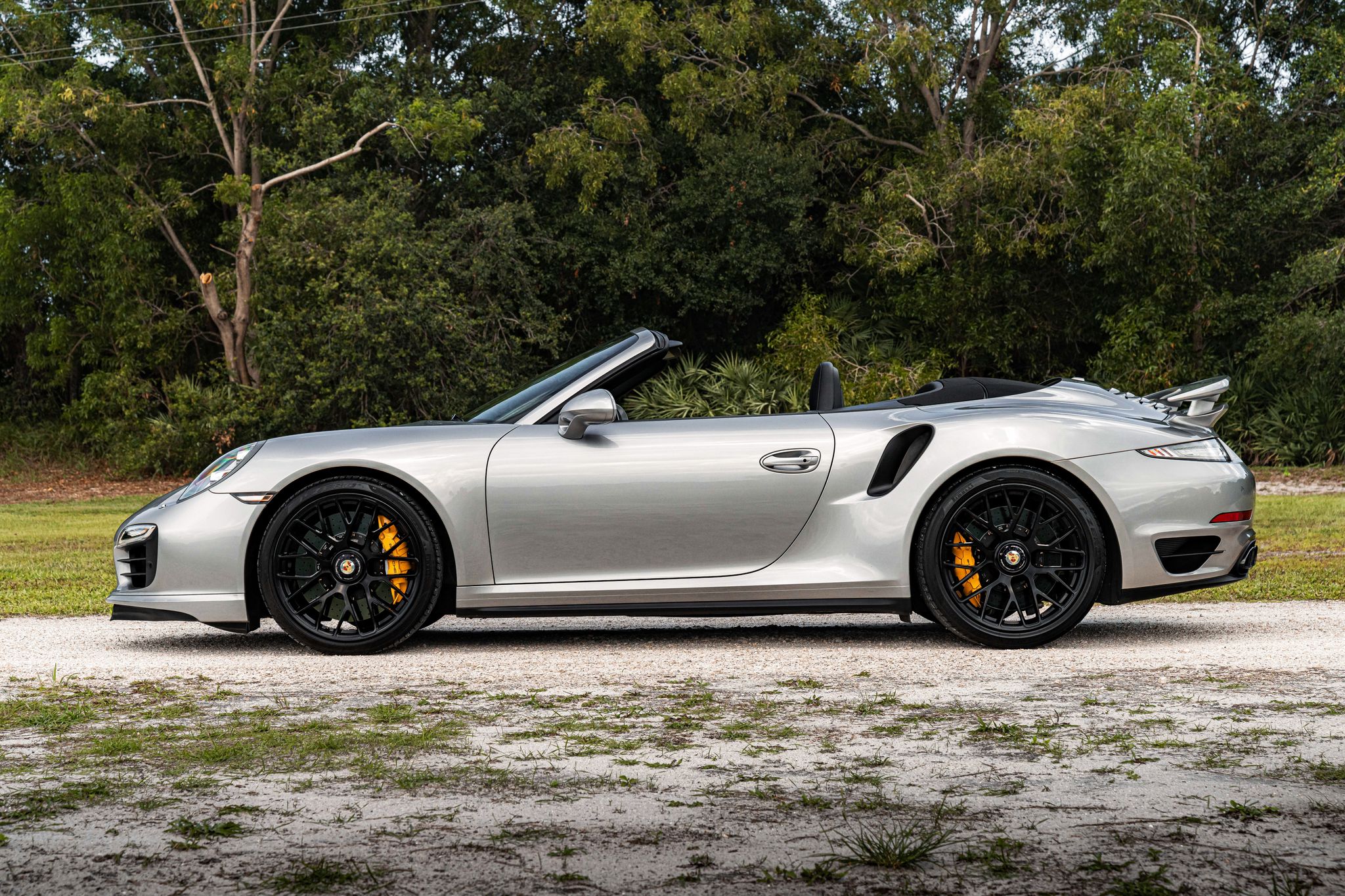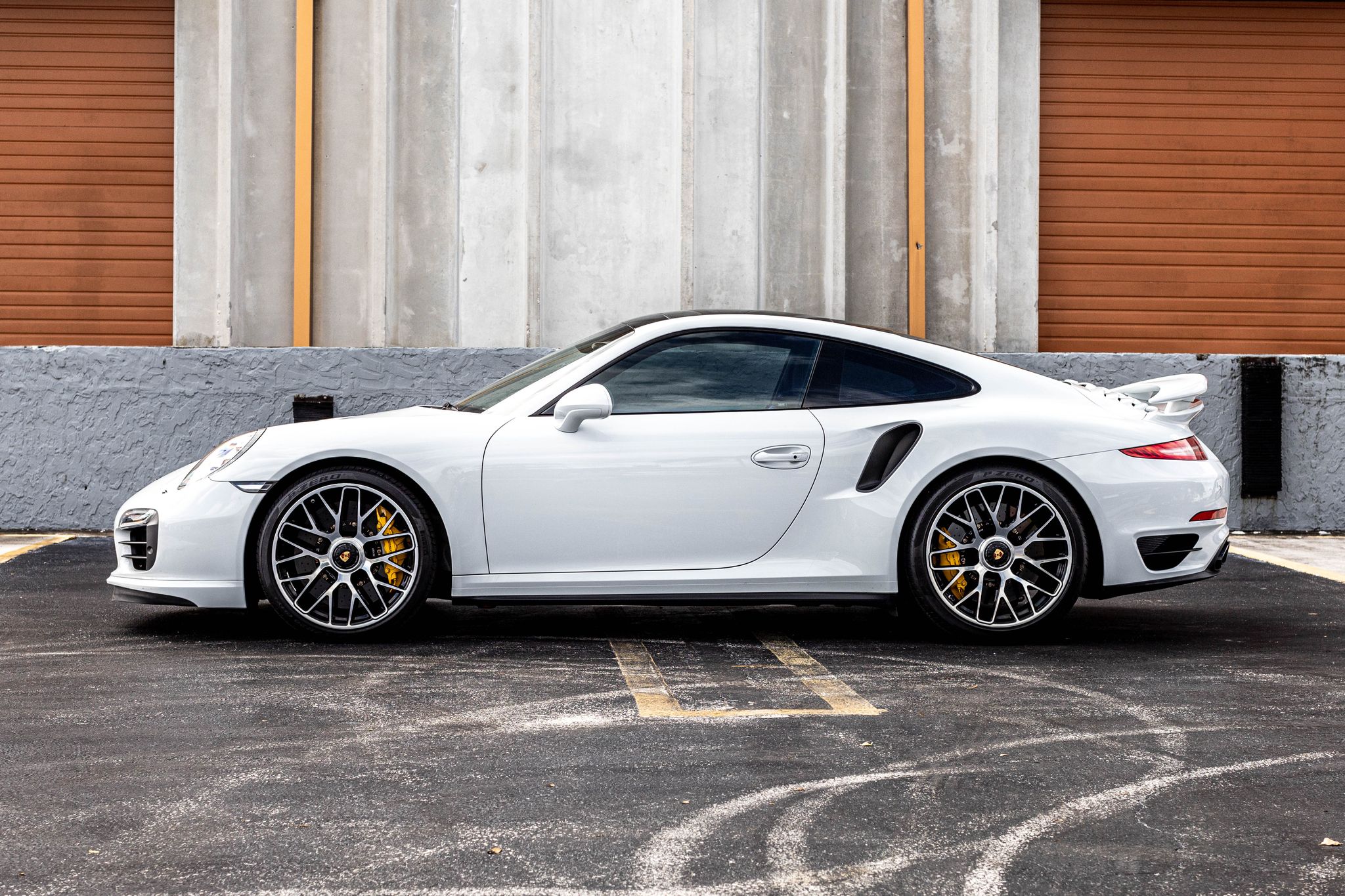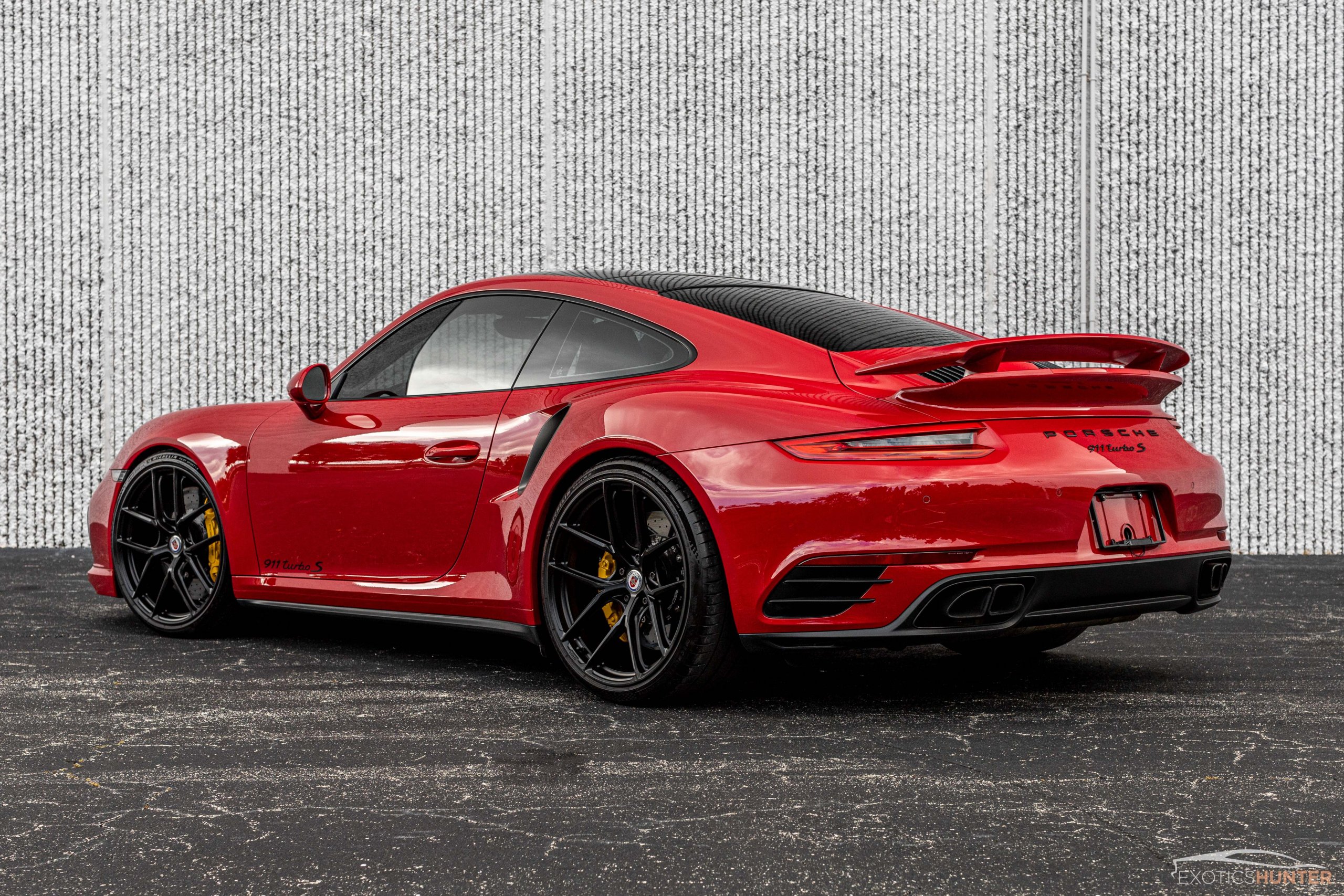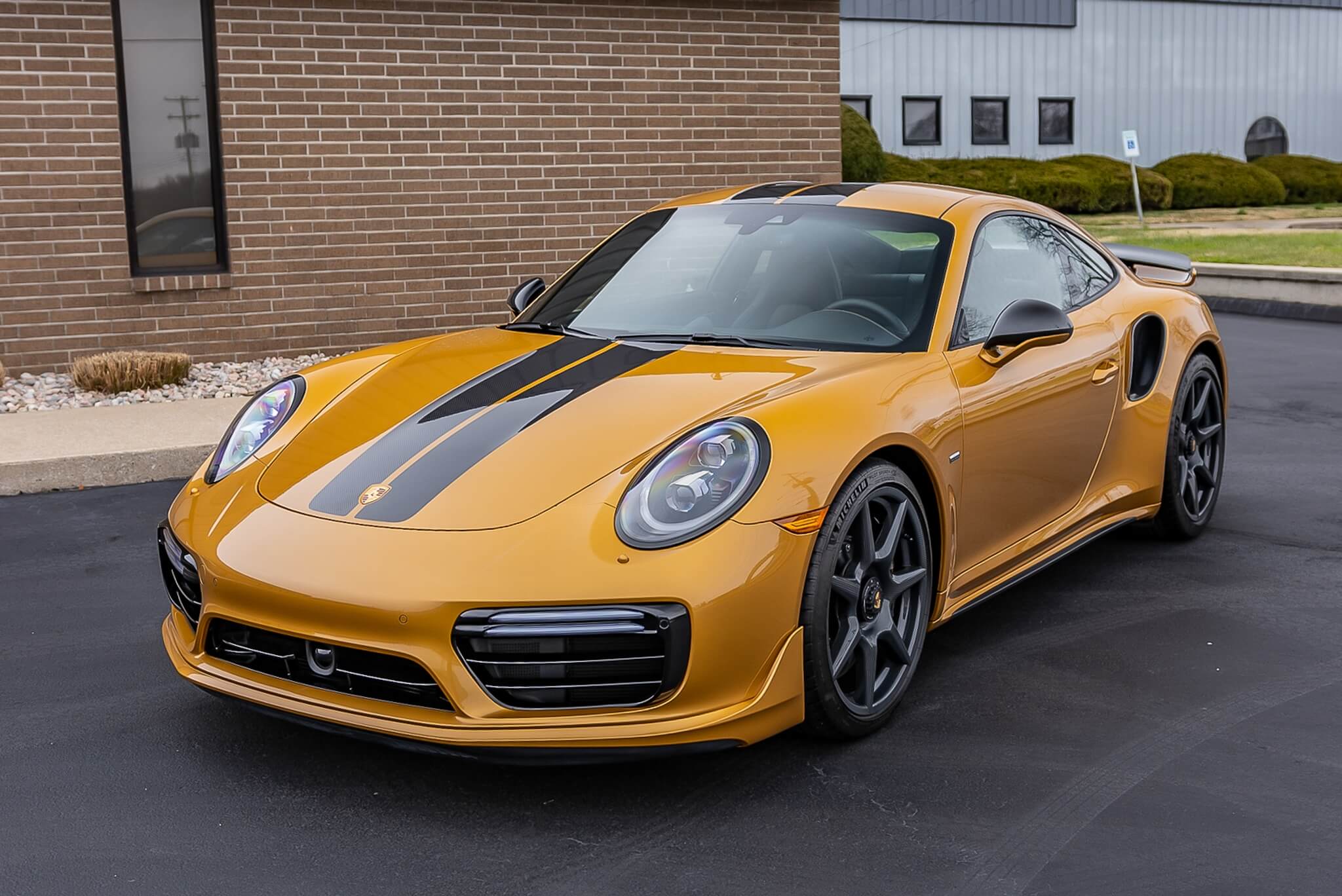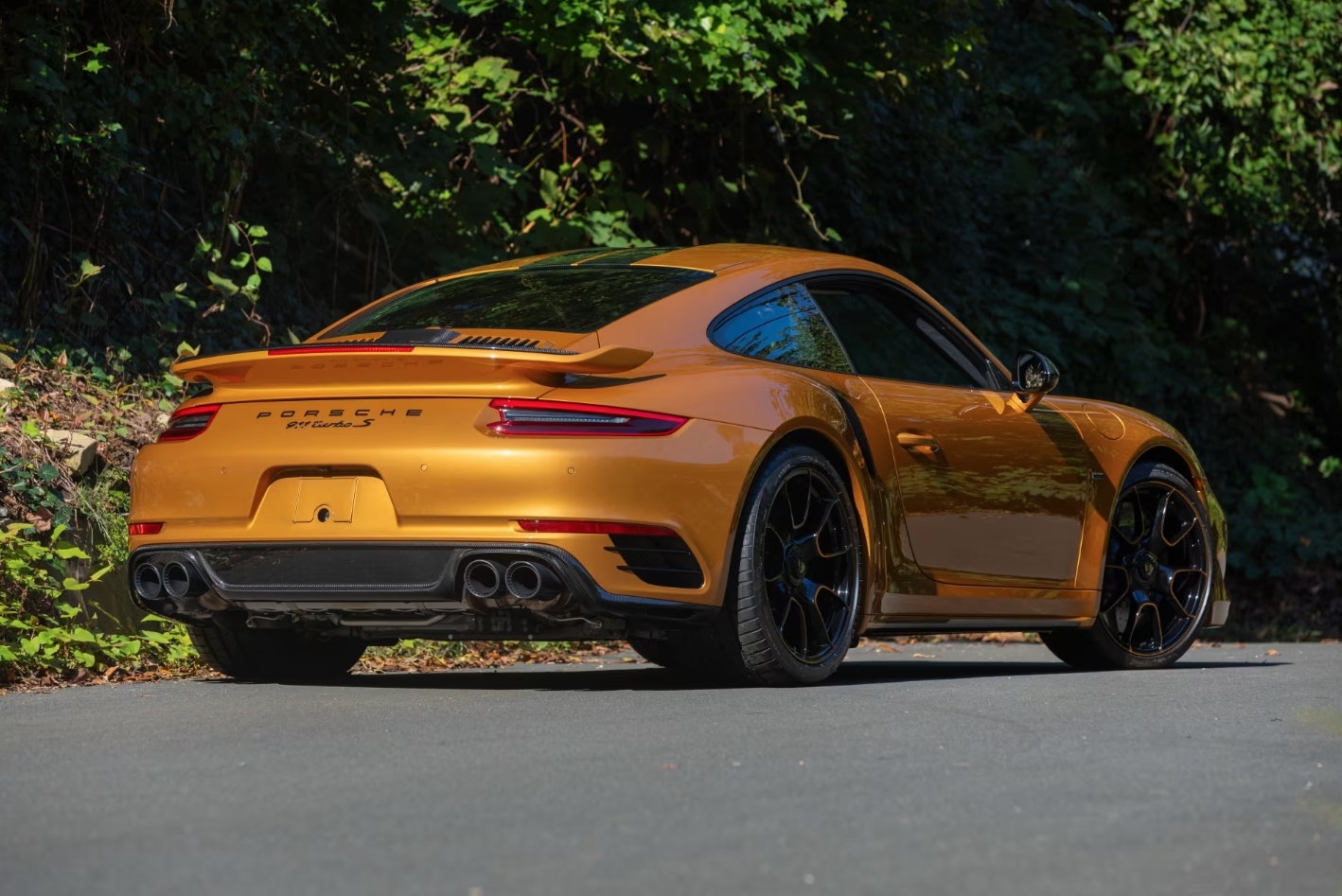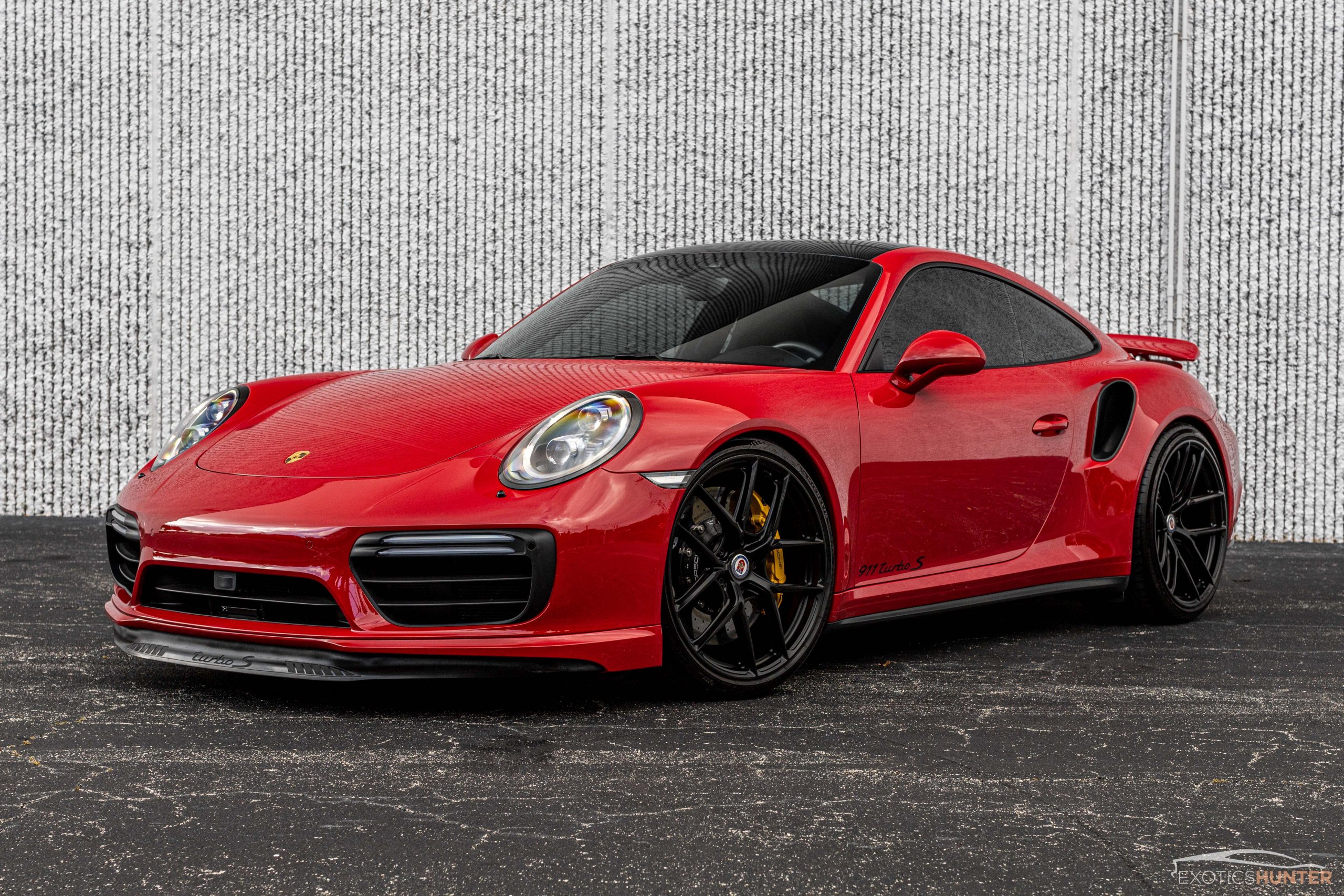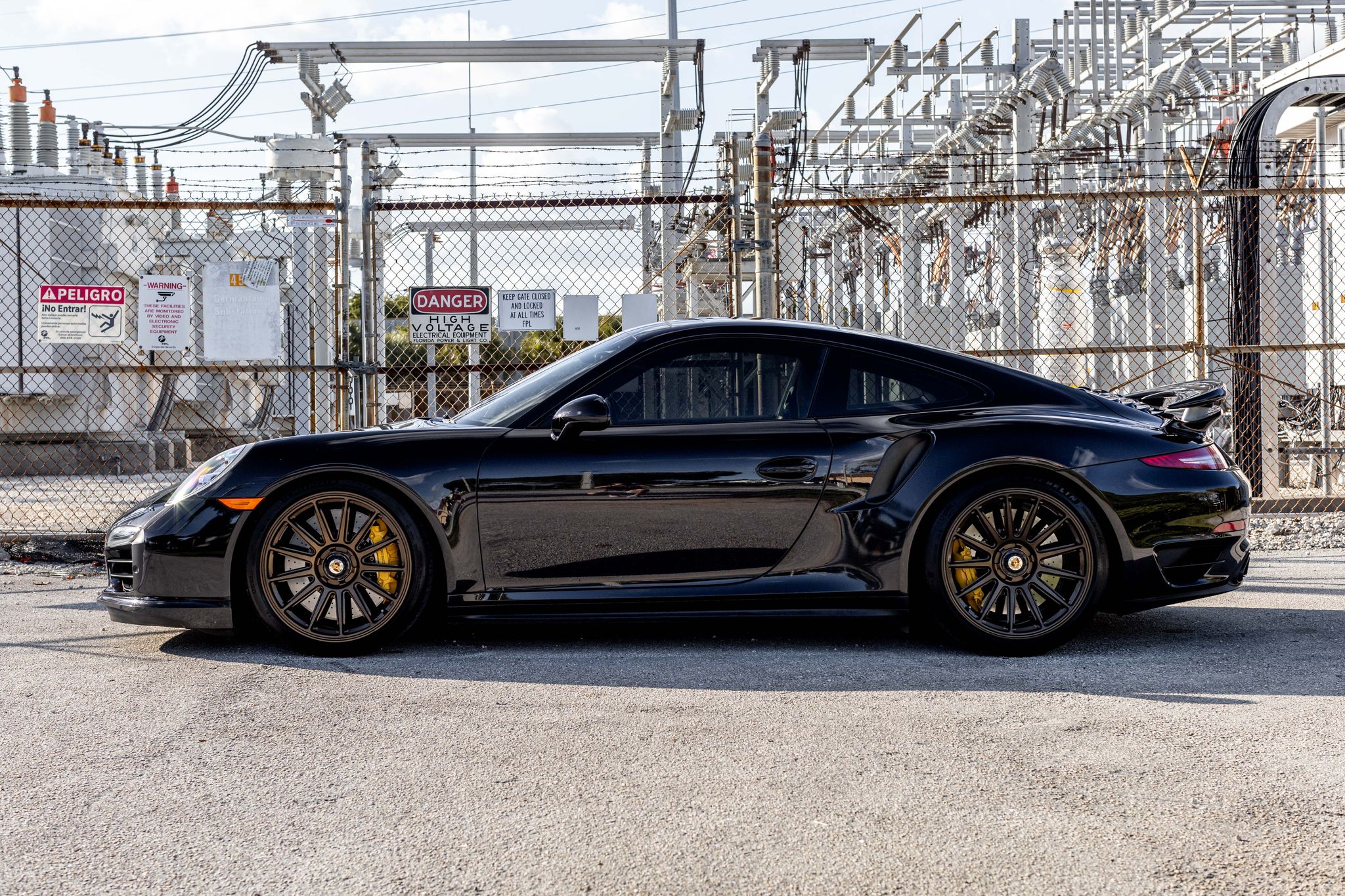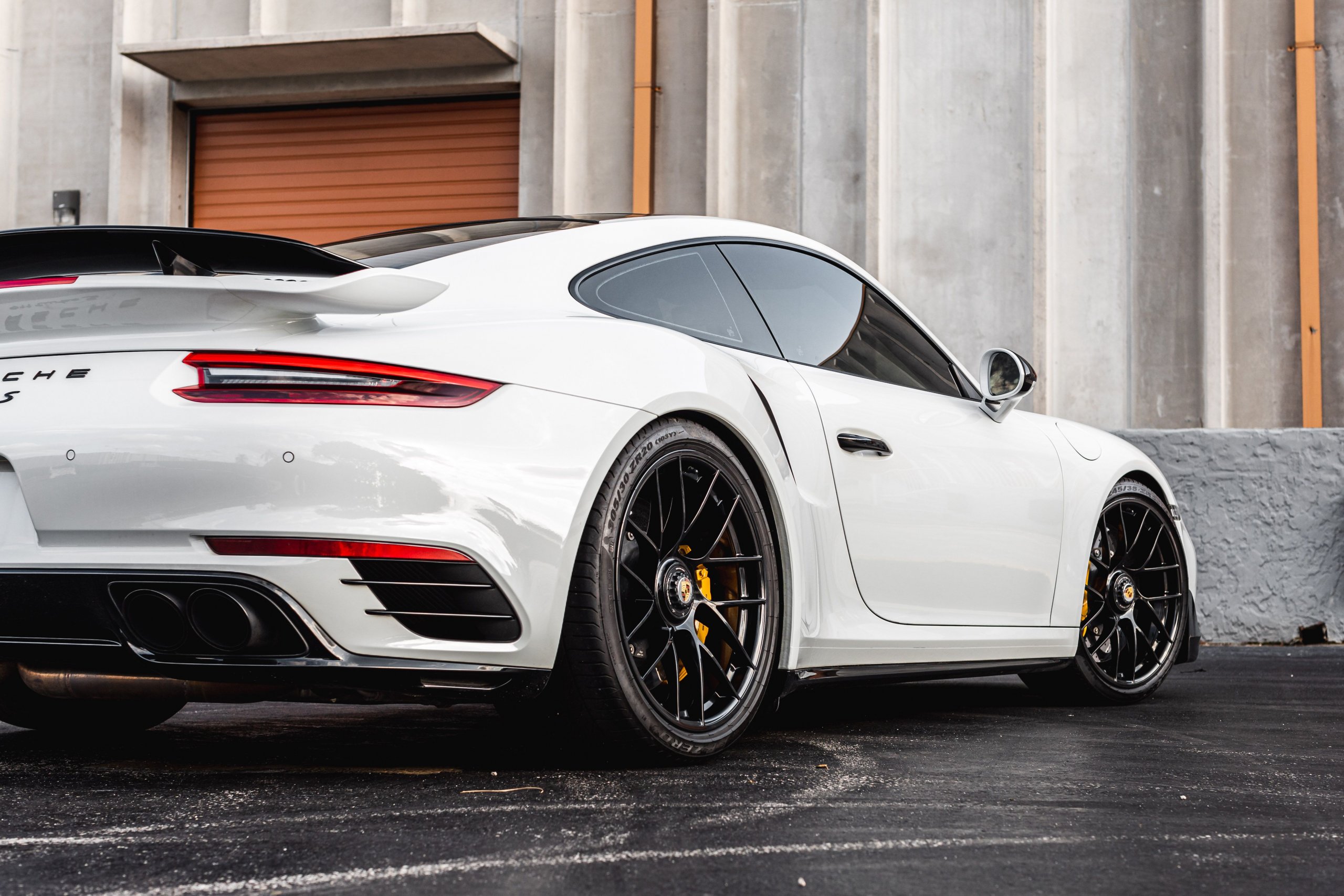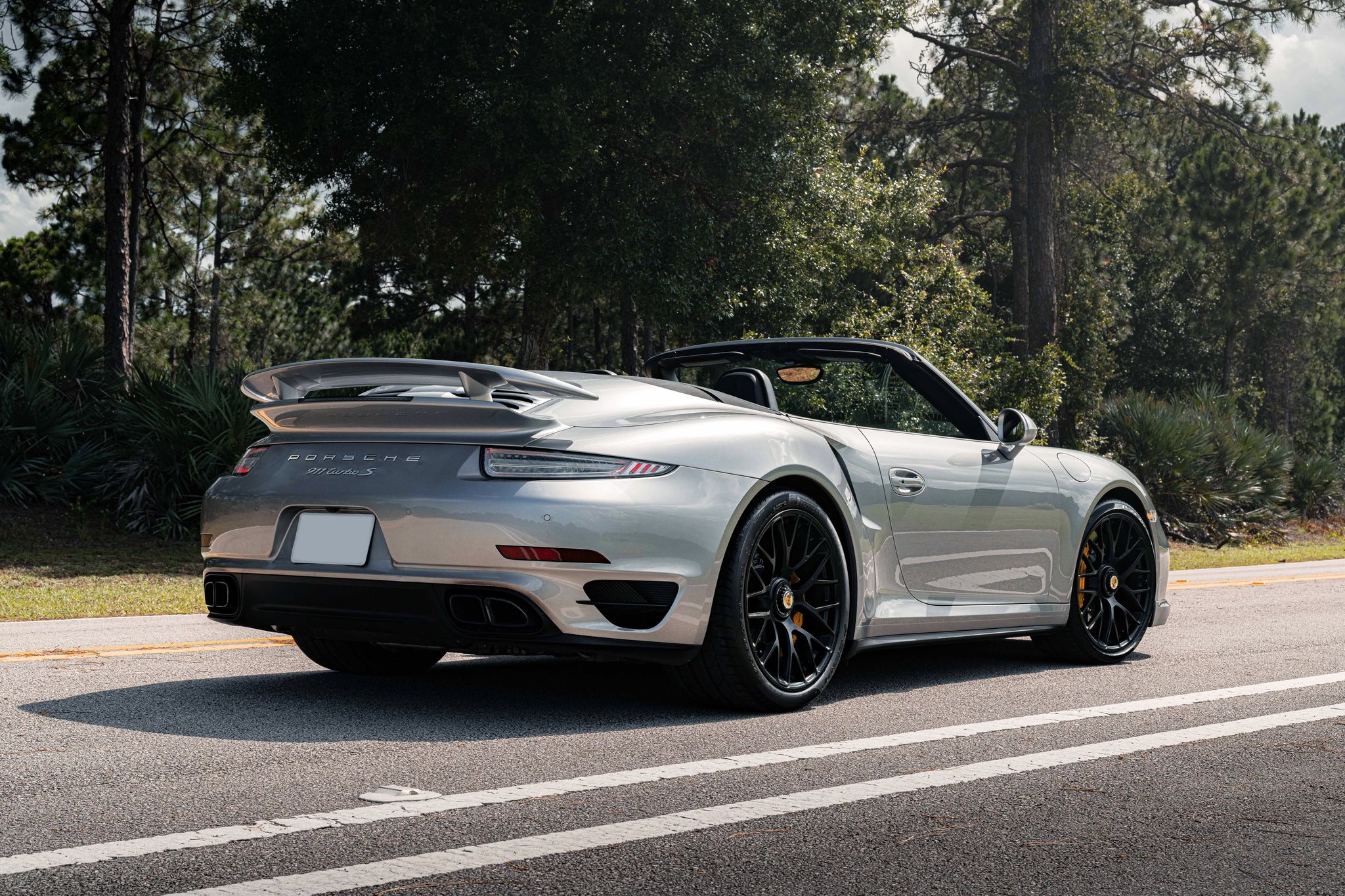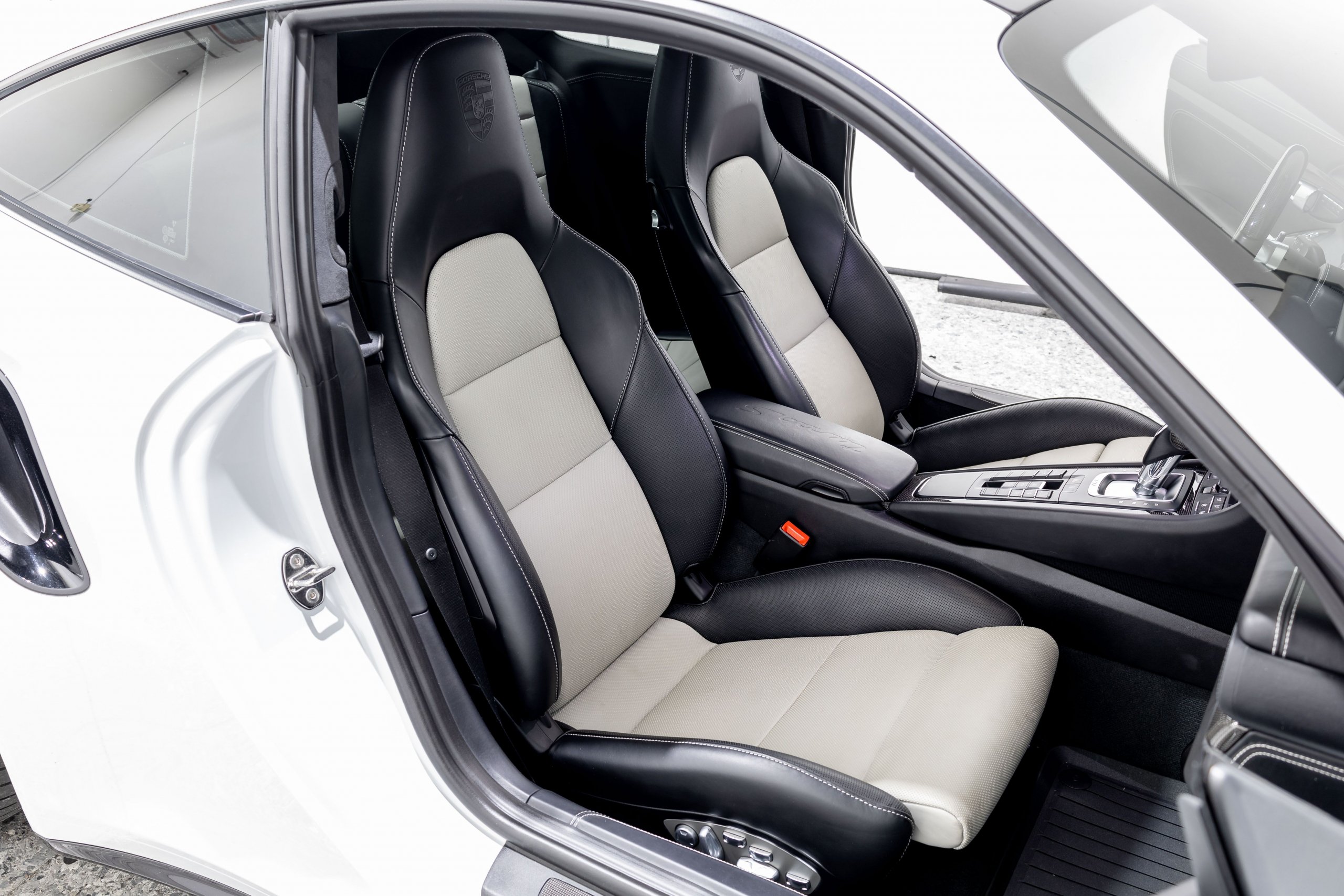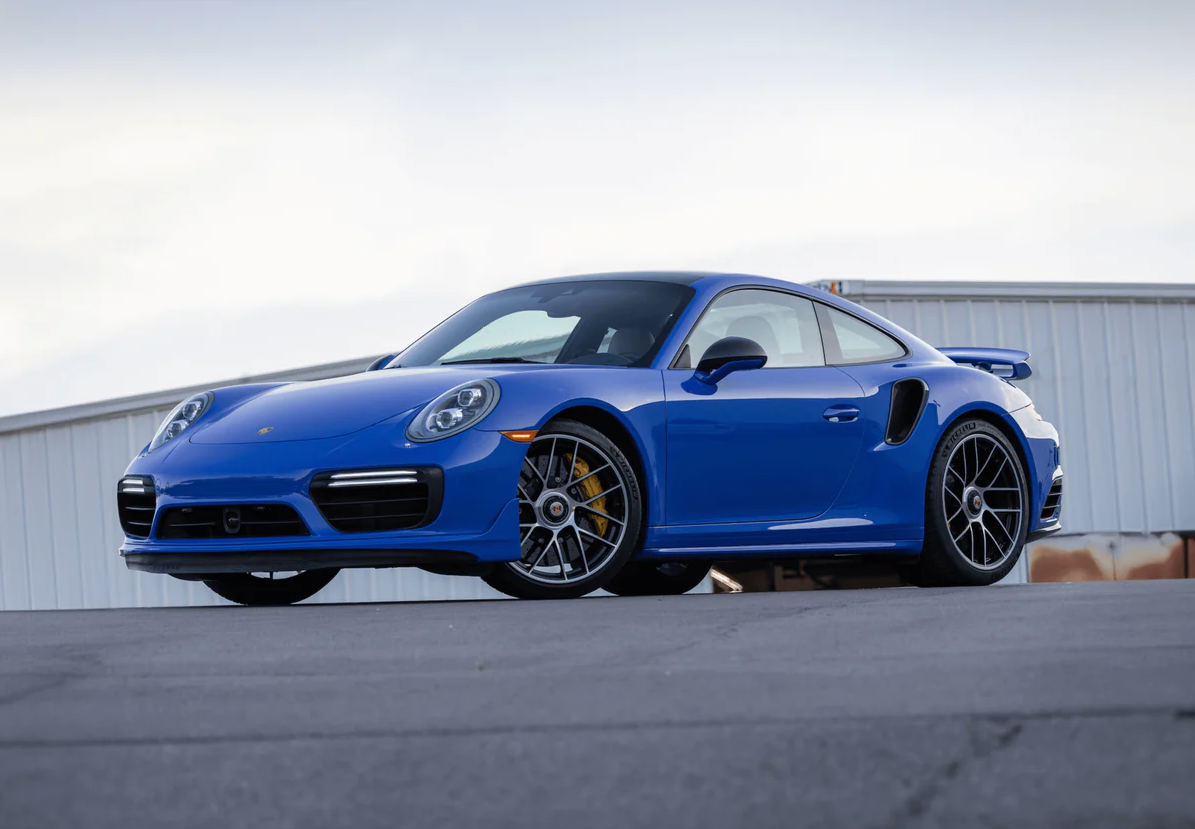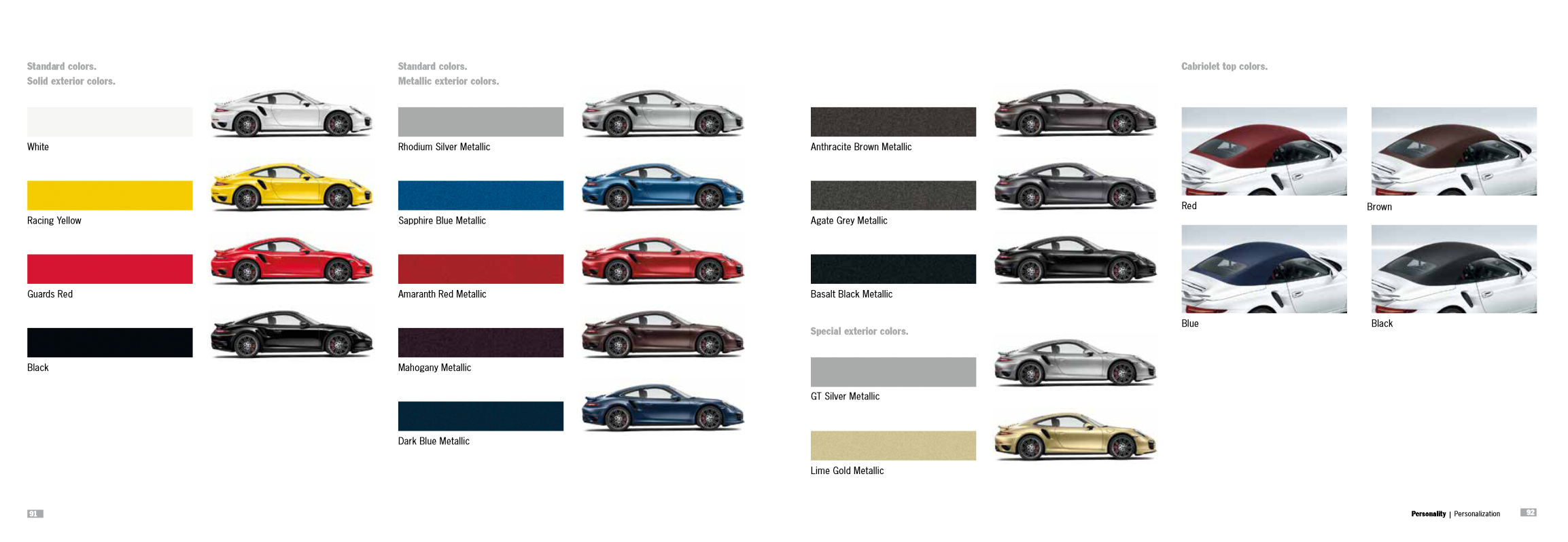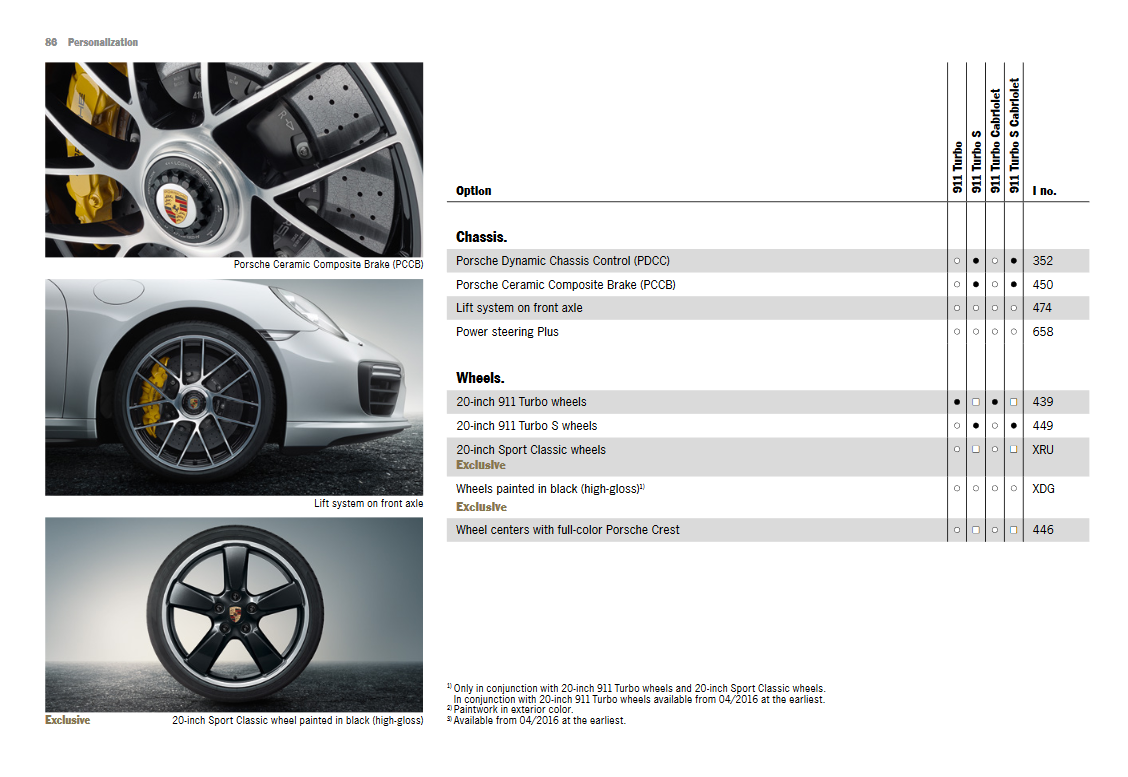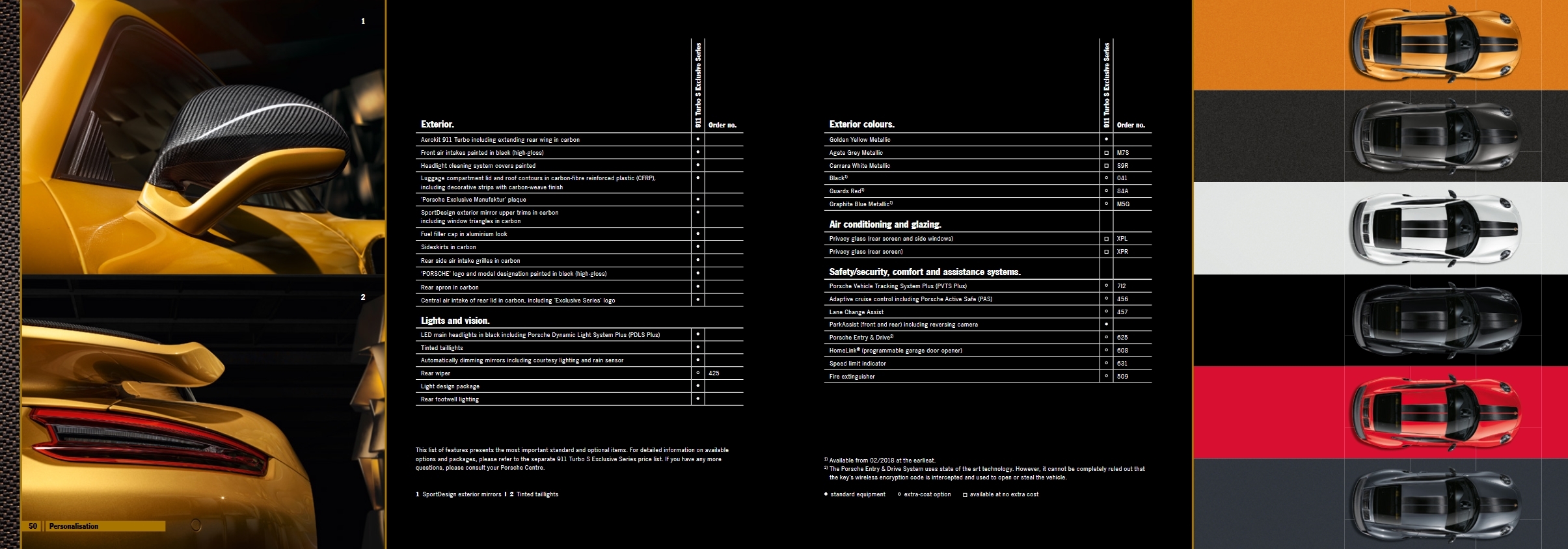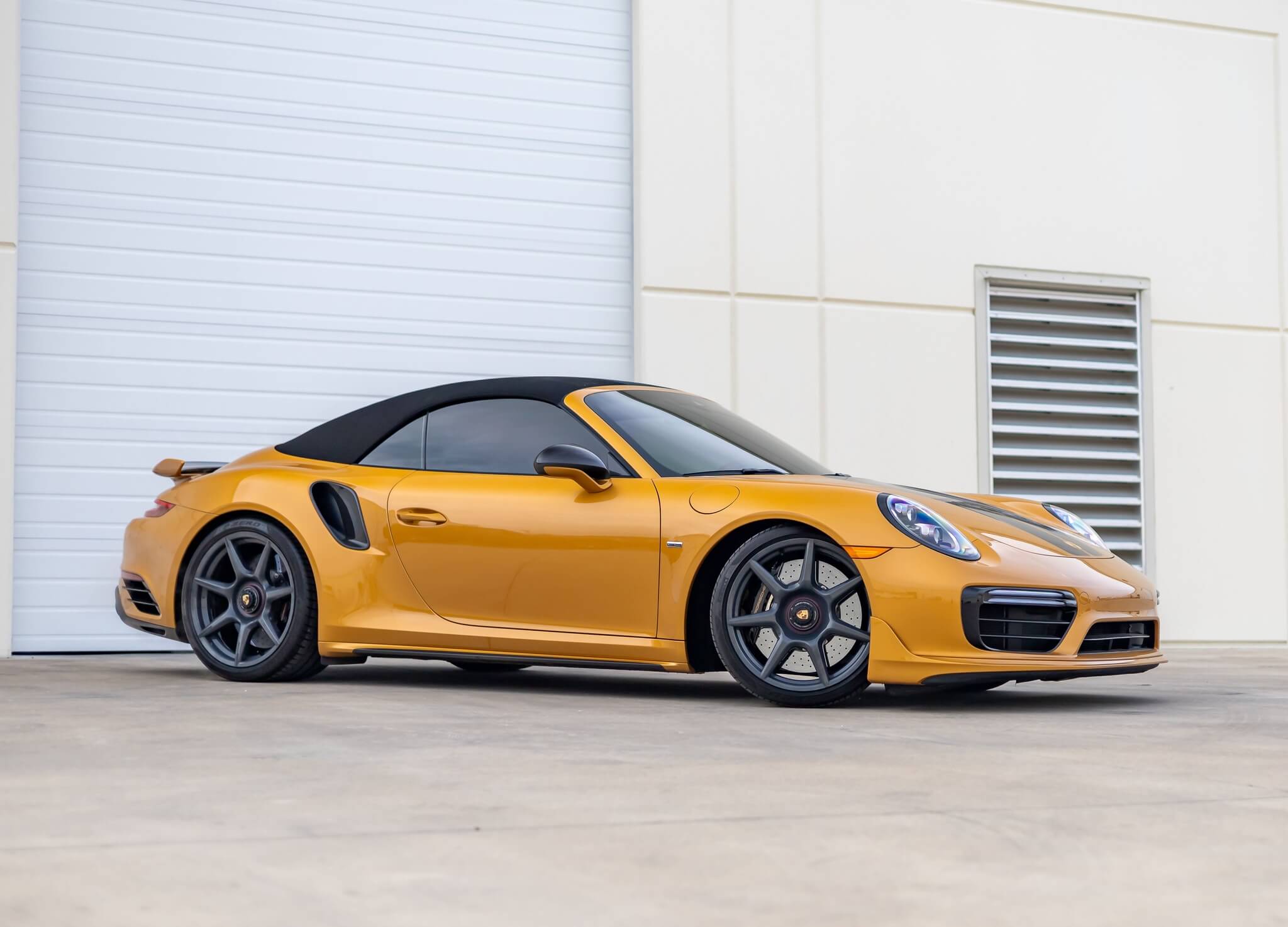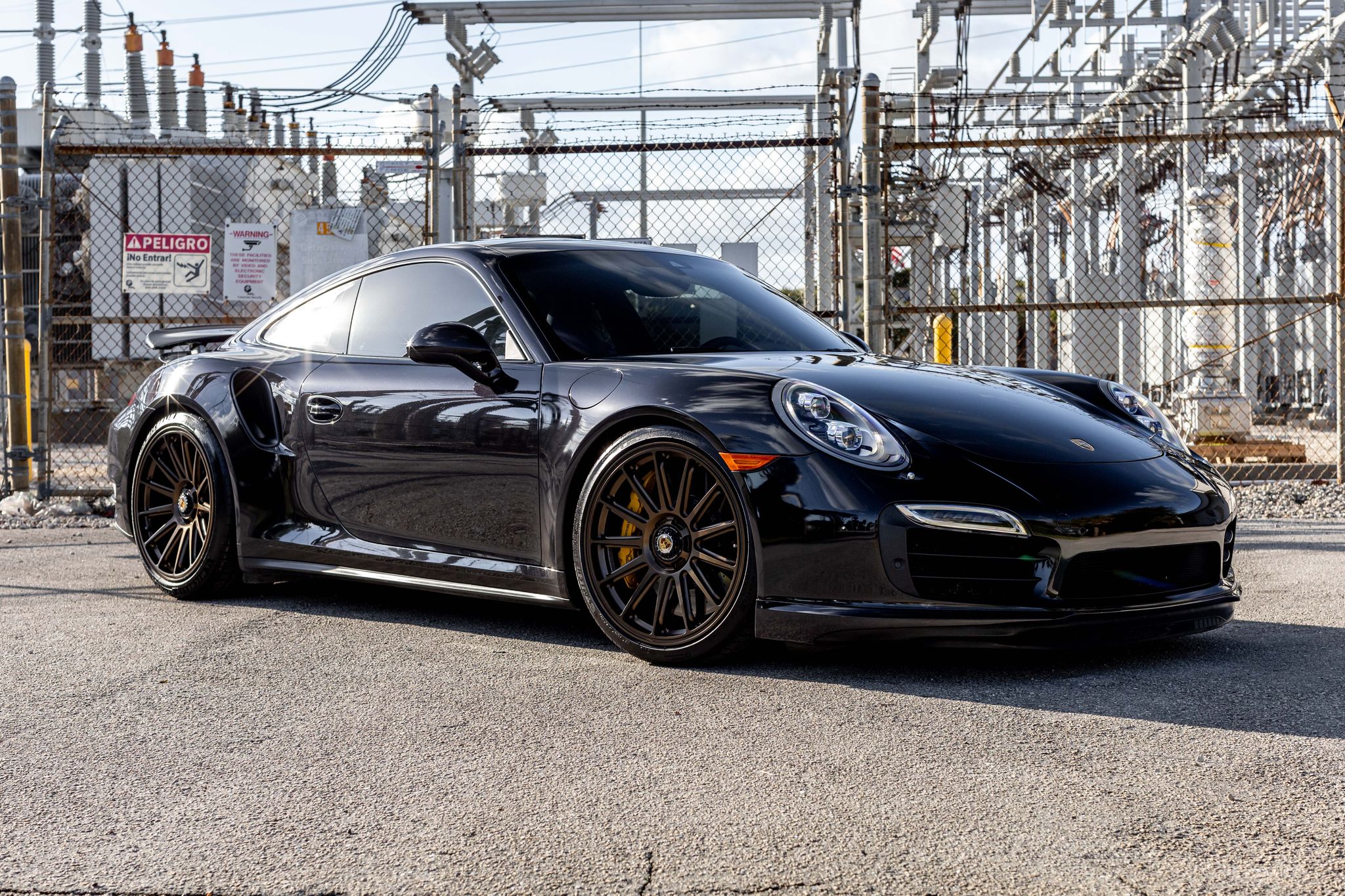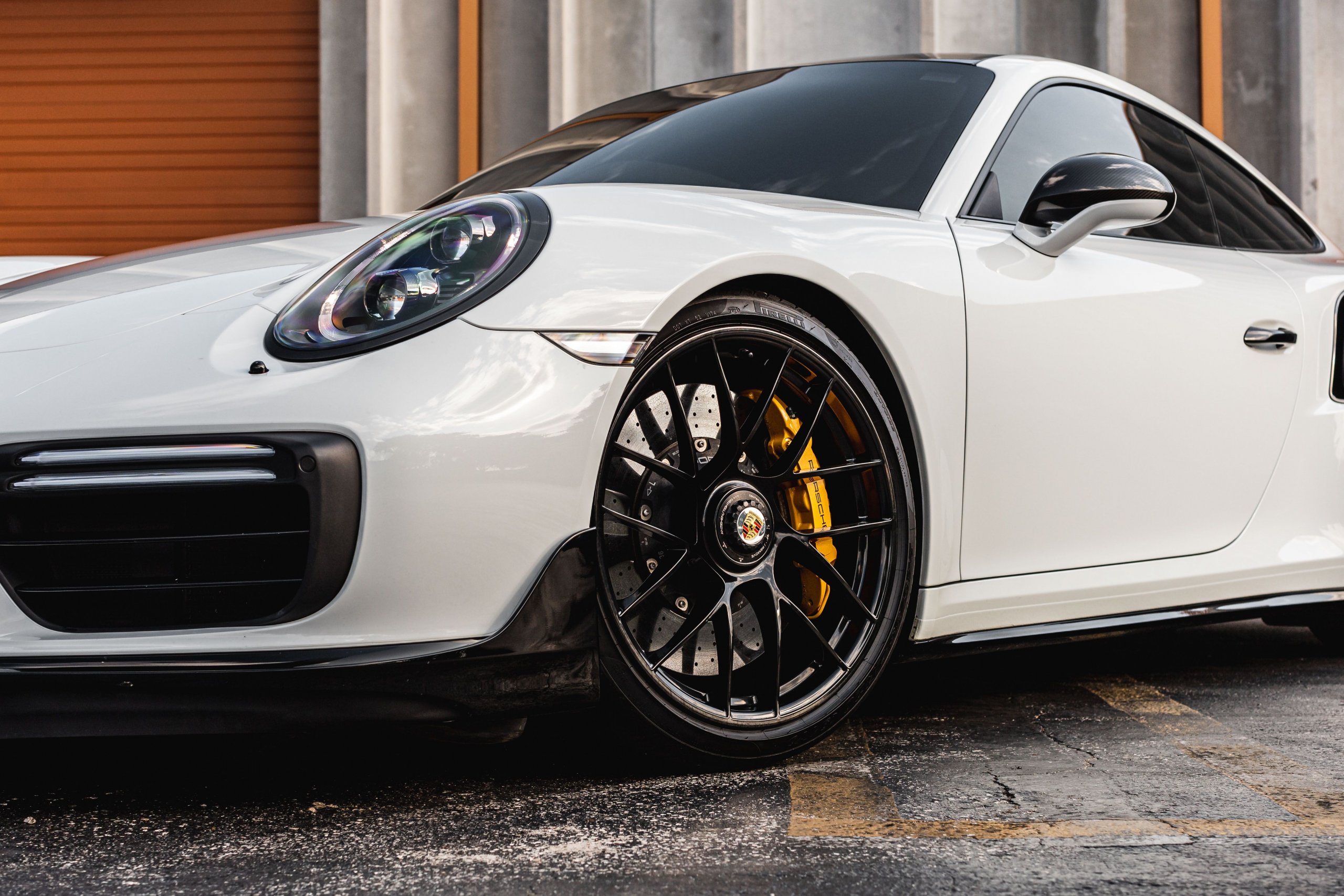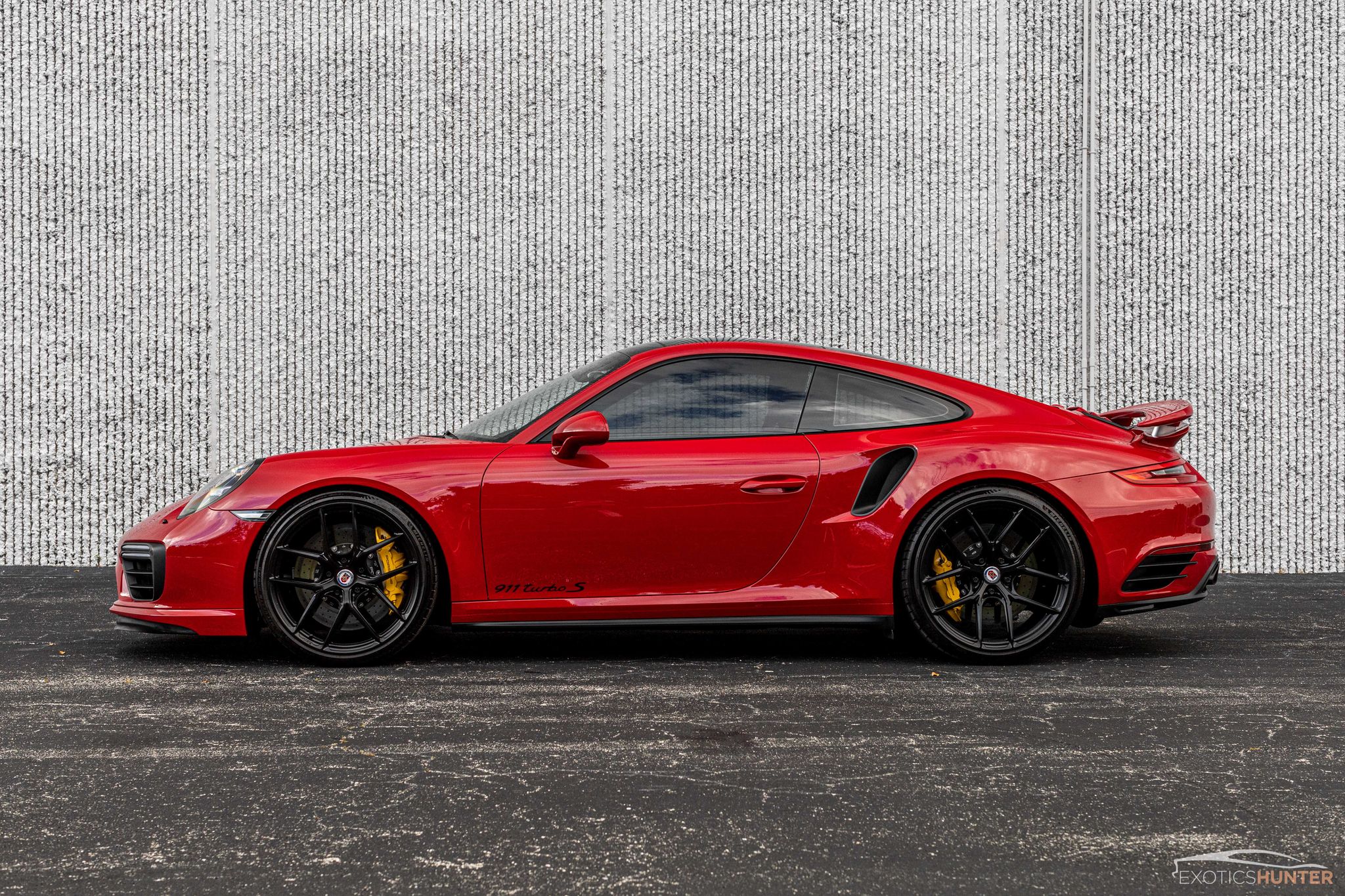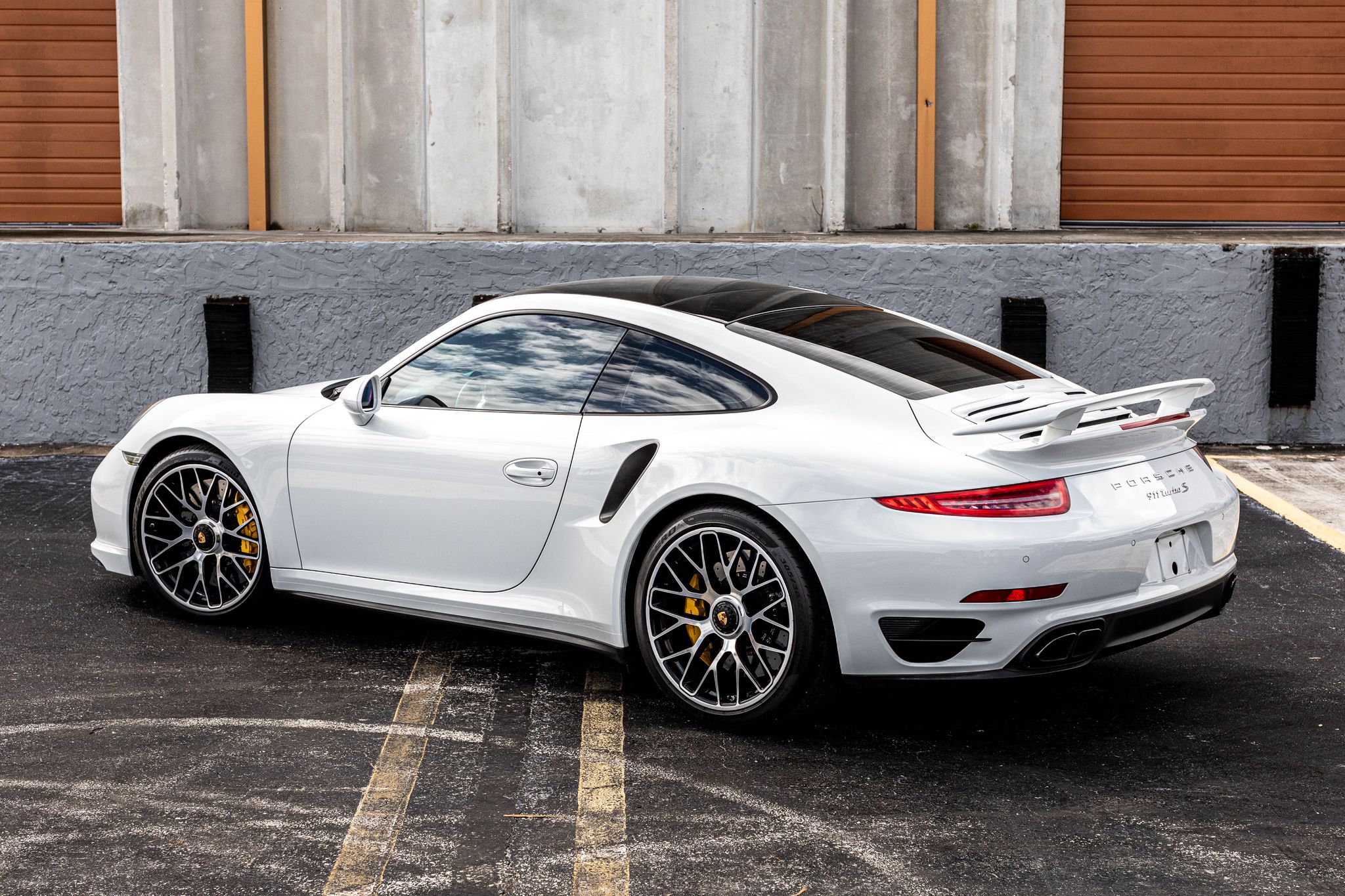The all-new Porsche 991.1 Turbo (coupe and cabriolet) was introduced in 2014, marking the beginning of a new era for the 911 Turbo series. It replaced the 997 Turbo, which had been in production since 2006. For Porsche, the challenge of creating a new Turbo model is always not an easy task, as each generation must surpass its predecessor in performance and innovation.
40 years following the debut of the initial 911 Turbo prototype, the 991 Turbo made its appearance, boasting a power output precisely double that of its forerunner. While the 911 Turbo is typically the most substantial model in the 911 lineup, its weight fortunately did not increase twofold.
The engine remains essentially the direct fuel injection (DFI) mechanism found in the 997 Turbo 3.8, with refined tuning has enhanced its output to 520 hp, maintaining the predecessor's power-to-weight ratio.
The 991 Turbo, equipped with its standard automatic transmission, weighs in 110 lb heavier than the 997 Turbo 3.8 with a manual gearbox. This model also marked the first instance of a 911 Turbo not offering a manual gearbox option and only comes standard with PDK transmission.
The Turbo's interior is covered with premium materials, including leather upholstery, brushed aluminum, and carbon fiber accents, emphasizing its high-performance pedigree. The sports seats, available in 18-way adaptive Sport Plus options with memory function, offer superior support during spirited driving while ensuring comfort on longer journeys.
Further enhancing the driving experience are features like the Sport Chrono package, integrating a lap timer and performance display, and ambient lighting that adds to the cabin's sophisticated ambiance. The 991.1 Turbo also includes advanced infotainment options with seamless connectivity, ensuring that both driver and passengers enjoy a blend of exhilarating performance and cutting-edge technology.
Porsche introduced an active aerodynamics system for the 991 Turbo, featuring a three-stage retractable front spoiler lip and a rear wing that can adjust to three different positions. This system allows for the configuration of both the front and rear spoilers to optimize high-speed cornering on the racetrack or achieve maximum velocity on straightaways.
In the performance setting, the front spoiler fully extends all its segments, creating significant downforce on the front axle. Likewise, the rear wing reaches its highest elevation and steepest angle of attack, producing maximum downforce on the rear axle.
For the first time, Porsche made the 991 Turbo S available right from the outset of the 991 Turbo's production. The Turbo S distinguished itself with GT3 mirrors, slightly altered front spoiler grilles, and unique interior details.
Continuing its tradition, the Turbo S was a more lavishly equipped variant of the Turbo, featuring a power kit that delivered 560 hp.
Standard equipment included the PDCC Porsche Dynamic Chassis Control hydraulic roll bar system, Sport Chrono package (offering Launch control and a 0.15 bar over boost function), dynamic engine mounts, PCCB Porsche Ceramic Composite Brakes, central locking wheels, full LED dynamic headlights, and 18-way adaptive Sport Plus seats with memory function.
Some of competitors to the 911 Turbo over the years include the McLaren 570S, Mercedes-Benz AMG GT, Acura NSX and the Audi R8 V10.
Although the available options are impressive vehicles in their own right, the 911 Turbo stands out as the combination of over 40 years of evolution, establishing it as the most practical and sensible choice among them.
Model Changes (Breakdown by Year)
2014 Porsche 991.1 Turbo
The 2014 model is the first full year of production for the 991.1 Turbo, which replaced the 997 Turbo.
Featuring a 3.8-liter Turbocharged flat-six engine that produced 520 hp in the Turbo, and 560 hp for the Turbo S.
Starting price for the coupe was $149,00 for the Turbo and $182,000 for the Turbo S. The starting price for the Turbo Cabriolet was $161,000 and $194,000 for the Turbo S Cabriolet.
2015 Porsche 991.1 Turbo
In 2015, Porsche introduced an optional aerodynamics package for the 991.1 Turbo and Turbo S, featuring a front lip spoiler, side rocker panels, a revised rear deck lid with a fixed trailing edge and side winglets, and an adjustable rear wing to enhance both performance and appearance, alongside updates to the Porsche Communication Management (PCM) system that improved the user interface and connectivity options.
Additionally, the introduction of new exterior and interior customization options allowed for unprecedented levels of personalization, enabling owners to tailor their vehicles with an expanded selection of colors and trim options to their liking.
Starting price for the coupe was now $151,00 for the Turbo and $182,000 for the Turbo S. The starting price for the Turbo Cabriolet was $163,000 and $194,000 for the Turbo S Cabriolet.
2016 Porsche 991.1 Turbo
In 2016, Porsche introduced a few enhancements across the 991.1 Turbo and Turbo S models.
Starting with the introduction of a dynamic boost function to improve throttle response by maintaining turbocharger pressure during brief throttle lifts, integrating the Sport Chrono package and Porsche Dynamic Light System (PDLS) as standard features to offer dynamic engine mounts, a performance display, and enhanced lighting, alongside chassis enhancements for improved handling and stability, which included making the Porsche Active Suspension Management (PASM) system a standard feature.
The interior also had new customization options such as additional leather and stitching choices, as well as incorporating the latest generation of the Porsche Communication Management (PCM) system for superior infotainment and connectivity.
The base price remained the same as the previous year.
2017 Porsche 991.2 Turbo
In 2017, the Porsche 991.2 Turbo and Turbo S models were unveiled with comprehensive updates, notably featuring a new 3.8-liter twin-turbocharged flat-six engine. This engine upgrade boosted the power output to 540 hp (20 hp more than 991.1 Turbo) for the Turbo and 580 hp (20 hp more than 991.1 Turbo S) for the Turbo S, marking a significant leap forward in their performance capabilities.
Additionally, these models saw the introduction of new turbochargers equipped with larger compressors, an improved fuel injection system, and a revamped intake system. These enhancements collectively contributed to a more robust and efficient performance, ensuring that both the Turbo and Turbo S models set new benchmarks in their class.
Complementing the mechanical and performance upgrades, the Porsche Communication Management (PCM) system received an overhaul for increased responsiveness. It now featured a more intuitive touchscreen, advanced navigation capabilities, and integrated connectivity options, including Apple CarPlay. Aesthetically, both models were refreshed with revised front and rear fascias, new designs for the headlights and taillights, and improved aerodynamic elements, further enhancing the 991.2 Turbo facelift.
Starting price for the coupe was now $159,000 ($8,000 more than the 991.1 Turbo) for the Turbo and $188,000 ($6,000 more than 991.1 Turbo S) for the Turbo S. The starting price for the Turbo Cabriolet was $171,000 ($8,000 more than the 991.1 Turbo Cabriolet) and Turbo S Cabriolet was $200,000 ($6,000 more than the 991.1 Turbo S Cabriolet).
2018 Porsche 991.2 Turbo
The Porsche 911 Turbo S Exclusive Series, unveiled in 2018, offered in coupe and as a cabriolet, distinguishing itself from the standard Turbo S with a series of bespoke enhancements. With its power output boosted to 607 hp, thanks to specialized engine tuning and optimized turbochargers, the Exclusive Series offered a more edriving experience with quicker acceleration and a higher top speed.
And at the time, Turbo S Exclusive Series was the most powerful and unique 911 Turbo S ever.
This Turbo S Exclusive Series stood out with its unique design elements, including the striking Golden Yellow Metallic paint complemented by carbon fiber stripes, exclusive 20-inch black wheels with Golden Yellow details, and additional carbon fiber components for improved aerodynamics and aesthetics.
The interior matched this exclusivity, featuring luxurious leather in a black and Golden Yellow theme, embossed Turbo S logos, and a badge indicating the car's unique number in the limited 1 of 500 production run.
Moreover, the Exclusive Series was not just about visual enhancements; it also included performance-oriented upgrades like a specific sport exhaust system. This, combined with dynamic handling upgrades, ensured that the Exclusive Series maintained a sharper edge in performance driving scenarios compared to its standard counterpart.
Porsche offered additional customization options through the Porsche Exclusive Manufaktur, allowing owners to tailor their vehicles to personal preferences.
The starting price for the Turbo S Exclusive Series was $260,000 ($72,000 more than the 991.2 Turbo S coupe and $60,000 more than the 991.2 Turbo S Cabriolet).
Porsche broadened the array of standard equipment across the Turbo and Turbo S models, incorporating advanced features such as Lane Change Assist and a heated multifunction steering wheel. These additions aimed to enhance driving comfort and safety, reflecting the brand's dedication to offering a comprehensive and sophisticated driving experience.
Additionally, the introduction of new 20-inch wheel designs for both the Turbo and Turbo S models provided a fresh aesthetic update, complementing the cars' dynamic performance capabilities. These new wheel options underscored Porsche's attention to detail and its pursuit of perfection in every aspect of vehicle design and functionality.
The price for the 991.2 Turbo and Turbo S remained the same as previous year.
2019 Porsche 991.2 Turbo
In 2019, the Porsche 991.2 Turbo and Turbo S models saw significant enhancements in chassis and handling, most notably through the optional Porsche Active Suspension Management (PASM) Sport suspension. This innovation not only reduced the ride height by 10mm but also markedly improved handling and driving dynamics, offering a more engaging and responsive driving experience.
The focus on refining the car's mechanical underpinnings underscored Porsche's commitment to delivering superior performance and handling characteristics that meet the expectations of even the most discerning drivers.
Simultaneously, Porsche advanced the safety and comfort features of the 991.2 Turbo and Turbo S models by incorporating new safety and assistance systems, including the Traffic Jam Assist feature within the adaptive cruise control option, enhancing driver convenience and safety in varying traffic conditions.
Interior upgrades were equally impressive, with a broader range of customization options introduced, including new stitching patterns, an array of leather options, and carbon fiber trim details, allowing owners to tailor the cabin to their personal tastes.
The price for the 991.2 Turbo and Turbo S remained the same as previous year.
Porsche 991 Turbo Common Problems
The Porsche 991 Turbo is regarded as one of the best sports cars around that is not only reliable but also fun to drive, with blistering performance that still manages to offer everyday usability and comfort.
Over the years, many 911 Turbos have been used as daily drivers, accumulating high mileage while still maintaining their reliability and performance.
This breaks the traditional belief that supercars are inherently unreliable.
However, it is essential to keep in mind that all cars, even supercars, can have issues and it is crucial to perform a Pre-Purchase Inspection (PPI) from an authorized dealer or experienced independent mechanic to reveal all issues.
Coolant Pipe Leaks: A number of 991 Turbo owners have encountered coolant leaks, a problem often attributed to the failure of adhesives or natural wear and tear over time. This issue necessitates prompt attention to prevent engine overheating and potential damage.
Transmission Concerns: Reports have surfaced regarding the PDK transmission in the Porsche 991 Turbo, with owners experiencing rough shifting patterns and delays in gear engagement. These issues appear to be more prevalent in earlier versions of the model and may require professional assessment to ensure optimal performance.
Engine Concerns: Engine-related problems in the 991 Turbo, while uncommon, have been documented. Owners have reported symptoms ranging from misfires to illuminated check engine lights, necessitating thorough diagnostic evaluations to pinpoint and resolve underlying issues.
Suspension Noises: Some drivers of the 991 Turbo have reported hearing creaks or knocks emanating from the suspension system. This is particularly noted in vehicles that have accumulated higher mileage or have been driven on less-than-ideal road surfaces, suggesting the need for inspection and possible suspension component replacement.
Turbocharger Wear: The turbochargers in the Porsche 991 Turbo, integral to its high-performance capabilities, are subject to wear over time. Continuous use can lead to a decrease in engine efficiency and power output, potentially necessitating the replacement of turbocharger components to maintain the vehicle's performance standards.
Electronic Issues: Issues with the electronic systems of the 991 Turbo, including glitches in the navigation, infotainment, and various sensor malfunctions, have been reported by some owners. These electronic discrepancies can affect the overall driving experience and may require software updates or hardware repairs to correct.
Recalls
2014-2015 Porsche 911 vehicles
Latches/locks/linkages: Hood: Latch (Recall no. 14V698000)
The front hood upper lock components were not manufactured to specification and may fail to securely latch the vehicle's hood during operation.
2016 911 Turbo S, 911 Turbo S Cabriolet vehicles
Air bags: Frontal: Passenger side: Inflator module (Recall no. 17V134000)
The passenger frontal air bag inflator initiator may fail to ignite during a crash.
2016-2017 911 vehicles
Air bags: air bag/restraint control module (Recall no. 19V533000)
The air bag Electronic Control Unit (ECU) may have a defective power supply capacitor that can result in air bag deactivation or inadvertent deployment of the air bags.
2017 911 Turbo Cabriolet vehicles
Visibility: Windshield
During manufacturing, the windshield may not have been properly bonded to the vehicle, allowing it to detach in a crash. As such, these vehicles fail to comply with the requirements of Federal Motor Vehicle Safety Standard (FMVSS) number 212, "Windshield Mounting."
2017 911 Turbo Cabriolet vehicles
Air bags: Side/window (Recall no. 16V946000)
The seat mounted side air bag inflator initiator may fail to ignite during a crash.
Maintenance and Ownership Costs
In comparison to other supercars, the Porsche 991 Turbo is known for its relatively minimal maintenance needs.
However, it is important to remember that regular maintenance and repairs will still be necessary, and the costs can vary depending on whether you take your car to a dealer or an independent mechanic.
Here are the suggested service schedule and intervals per Porsche:
Annual Maintenance or Every 6K Miles:
Vehicle Inspection
Change engine oil and filter
Update or replace maintenance items based on the inspection
Replace engine air intake filters Add the following maintenance items to the annual service, based on the time or mileage intervals shown below:
Additional Maintenance Every 12K or 2 years:
Replace Spark Plugs
Replace brake fluid
Replace the cabin pollen filter
Replace cabin pre-filter element
Replace engine air intake filters
Additional Maintenance Every 24K or 4 Years:
Replace drive belt
Additional Maintenance Every 48K or 6 years:
Replace PDK clutch fluid
Clean throttle body
Additional Maintenance Every 96K or 12 years:
Replace manual transmission fluid
Replace PDK transmission oil
Here is a rough estimate of typical service costs associated with the Porsche:
Oil Change - As low as $300 for independent mechanics and $480 for dealers.
Minor Service - Typically includes oil change, cabin filters, and engine filters. The cost from a dealer is around $1,500
Major Service - Typically includes all the above plus spark plugs, brake flush, trans flush, expect about $2,500 from a dealer.
Tires - A set of high-performance tires like Michelin PS4 will cost about $2,000.
Brakes - Rotors are carbon ceramic which should last forever. Aftermarket brake pads that are OE equivalent will cost about $800 for a full set. Steel breaks would cost about $6,000 to replace.
Clutch - Dual clutch transmission should last the lifetime of the car so expect zero additional expenses for clutch or flywheel service.
Options List
The Porsche 991 Turbo has a list of options and packages that customers can choose from.
Some other exterior options that Porsche offered for the 991 Turbo included an aero kit, which came with new front spoiler with side fins, side skirts, and wing. It is not a common option, however, it can make the car look more aggressive.
A few also chose to upgrade their Turbo that came standard steel brakes to carbon ceramic brakes (PCCB), and even more rare would be a center lock wheel that came standard on the Turbo S.
The sport chrono is another optional upgrade that a few who like to take their 991 Turbo to the track enjoy. This package adds a dynamic performance dimension, featuring a dashboard-mounted stopwatch, a mode switch on the steering wheel for selecting driving modes, and performance-oriented functions such as launch control and a more aggressive sport plus setting for enhanced engine, transmission, and chassis responses.
Other popular options include ventilated seats for increased comfort during warmer conditions, 18-way adjustable sport seats for superior support and customization, along with carbon fiber interior.
Also, a handful of 991 Turbo customers also went through the PTS (Porsche to Sample) program which was a factory-in-house customization program, that allowed customers to personalize their Porsche with a unique exterior. For individual unique interior colors, materials, and features that were not available on regular production models, you would have to go through the Porsche Exclusive Manufaktur department.
Because of the strict approval requirements, cars that went through the PTS and Porsche Exclusive Manufaktur program are considered highly desirable.
These cars usually command a higher premium in the market due to their exclusivity and uniqueness.
Here are some examples of option changes
2014 Porsche 991.1 Turbo Options List
2016 Porsche 991.2 Turbo Options List
Porsche 991.2 Turbo S Exclusive Series Options List
Key Options
- Aerokit
- PCCB’s (Porsche carbon ceramic brakes) on Turbo
- Sport Chrono option
- 18-way adjustable sport seats
- PTS and Porsche Exclusive Manufaktur interior
991.1 and 991.2 Porsche Turbo Price and Value (Turbo, Turbo S and Exclusive Series)
The Best Porsche 991 Turbo To Buy
The 991 Turbo lineup, spanning from the initial release to the facelifted versions, includes the Turbo, Turbo S, the 991.2 facelift models, and the limited edition Turbo S Exclusive Series. Deciding on the best 991 Turbo to buy depends on individual preferences for performance, features, and collectability.
The Porsche 991 Turbo, introduced as part of the first iteration of Porsche's 991 model line, set a new standard for high performance everyday sports car. With its 3.8-liter twin-turbocharged engine, the Turbo model offers great performance that's suitable for both daily driving and spirited weekend drives.
Its all-wheel-drive system, advanced aerodynamics, and beautiful interior make it a solid choice for those seeking a blend of speed and comfort. This model serves as an excellent entry point into the world of Porsche Turbo ownership, offering a balance of performance and practicality.
For those seeking even more power and performance features, the 991 Turbo S elevates the driving experience further. The Turbo S comes equipped with a more powerful engine, producing an increased horsepower output over the standard Turbo model, along with a host of performance enhancements such as ceramic brakes, active suspension management, and dynamic chassis control.
The Turbo S also features a more luxurious interior and additional standard equipment, making it an attractive option for buyers who demand the best in terms of performance and comfort.
The introduction of the 991.2 facelift brought about significant improvements to both the Turbo and Turbo S models. These updates included a power boost for both models, refined aerodynamics, enhanced connectivity features, and the introduction of new driver assistance technologies.
The 991.2 versions also benefited from a modernized interior and exterior styling, keeping the model line fresh and appealing to new buyers. The facelifted Turbo S stands out as a particularly enticing choice, offering the pinnacle of performance in the 991 lineup with its increased power output and advanced technology features.
At the top of the hierarchy is the Turbo S Exclusive Series, a limited-edition model that represents Porsche's engineering and design capabilities. With its increased power output, distinctive aesthetic enhancements, and upgraded interior, the Exclusive Series is aimed at the collectors and enthusiasts.
However, all versions of the 991 Turbo, starting with the first models before the facelift, are great buys due to how well they're made and how reliable they are. These cars show off Porsche's top-notch dependability, with only a few big issues ever reported.
With more cars today moving towards hybrid and electric direction, and collectors are hunting down cars with internal combustions engines even more.
In addition, the condition and mileage of the car are also important factors to consider when buying a 991 Turbo. There are many that have been driven hard and have been modified. But the ones that are more likely to retain their value in the long run and will fetch the most money will be a well-maintained car with low mileage.
Therefore, it's important to do your research, compare prices, and look for well-maintained cars if you are considering purchasing a 991 Turbo with the goal of not losing any money.
Conclusion
In conclusion, for around ($120,000+) the 991 Turbo is an amazing choice for a sports car you can depend on.
While the McLaren 570S, Mercedes-Benz AMG GT, Acura NSX and the Audi R8 V10 are available contenders, the 991 Turbo stands out due to its unmatched blend of daily drivability, performance, and value.
If you’re in the market for a high performance sports car that is reliable, you cannot go wrong with the 991 Turbo.
"Porsche… There is no substitute.” -Ferdinand Porsche
Car Hacking Shortcuts
Spec matters: Look for any PTS exterior color and Porsche Exclusive Manufaktur interior
Sport Chrono package
Turbo S is desirable
Look for well-maintained, low miles vehicles

